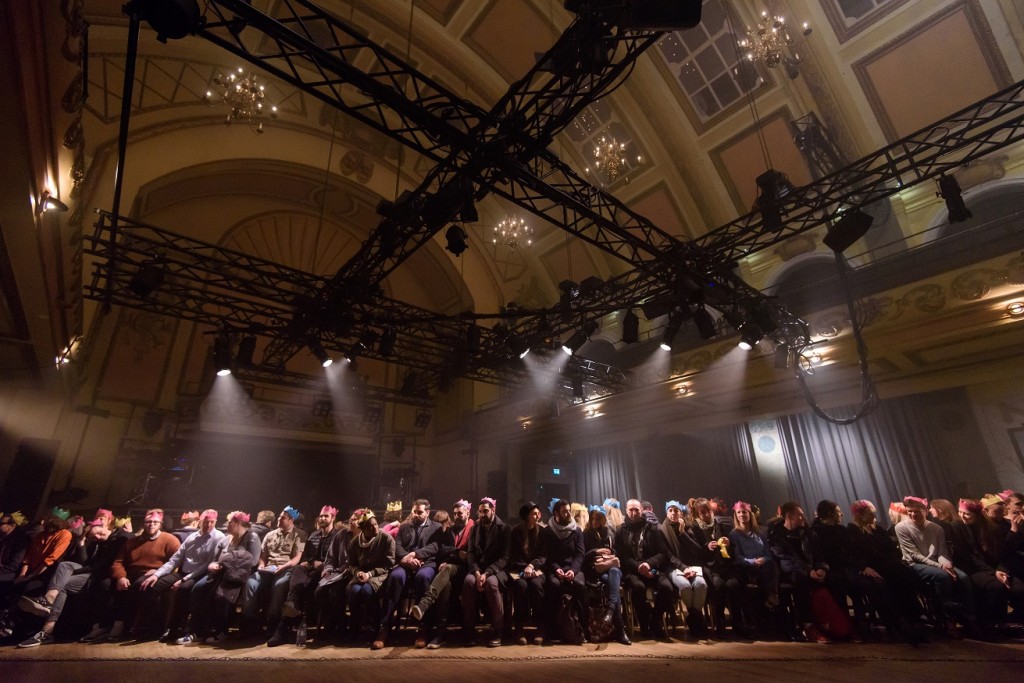Party Skills For The End Of The World
Party Skills For The End Of The World
Party Skills For The End Of The World
Shoreditch Town Hall
2018
Party Skills For The End Of The World
Party Skills For The End Of The World
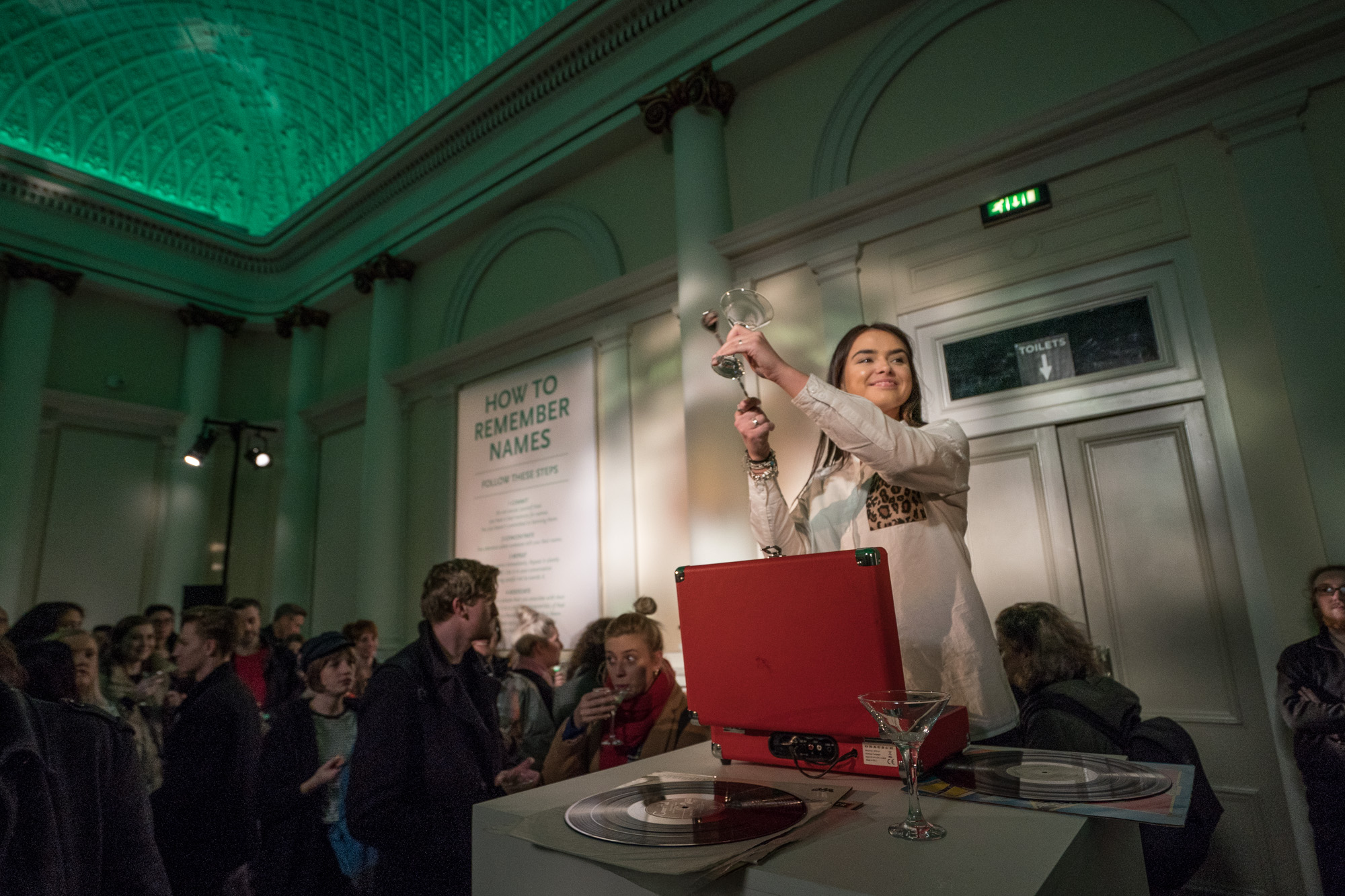
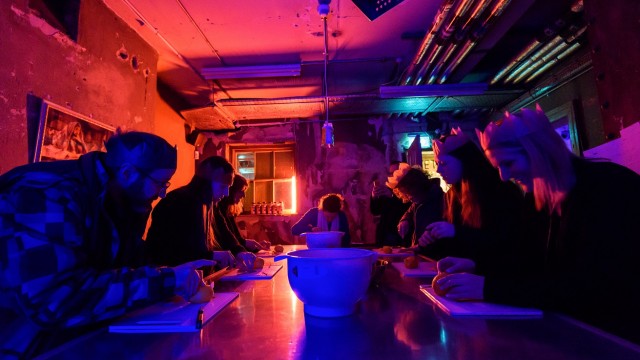
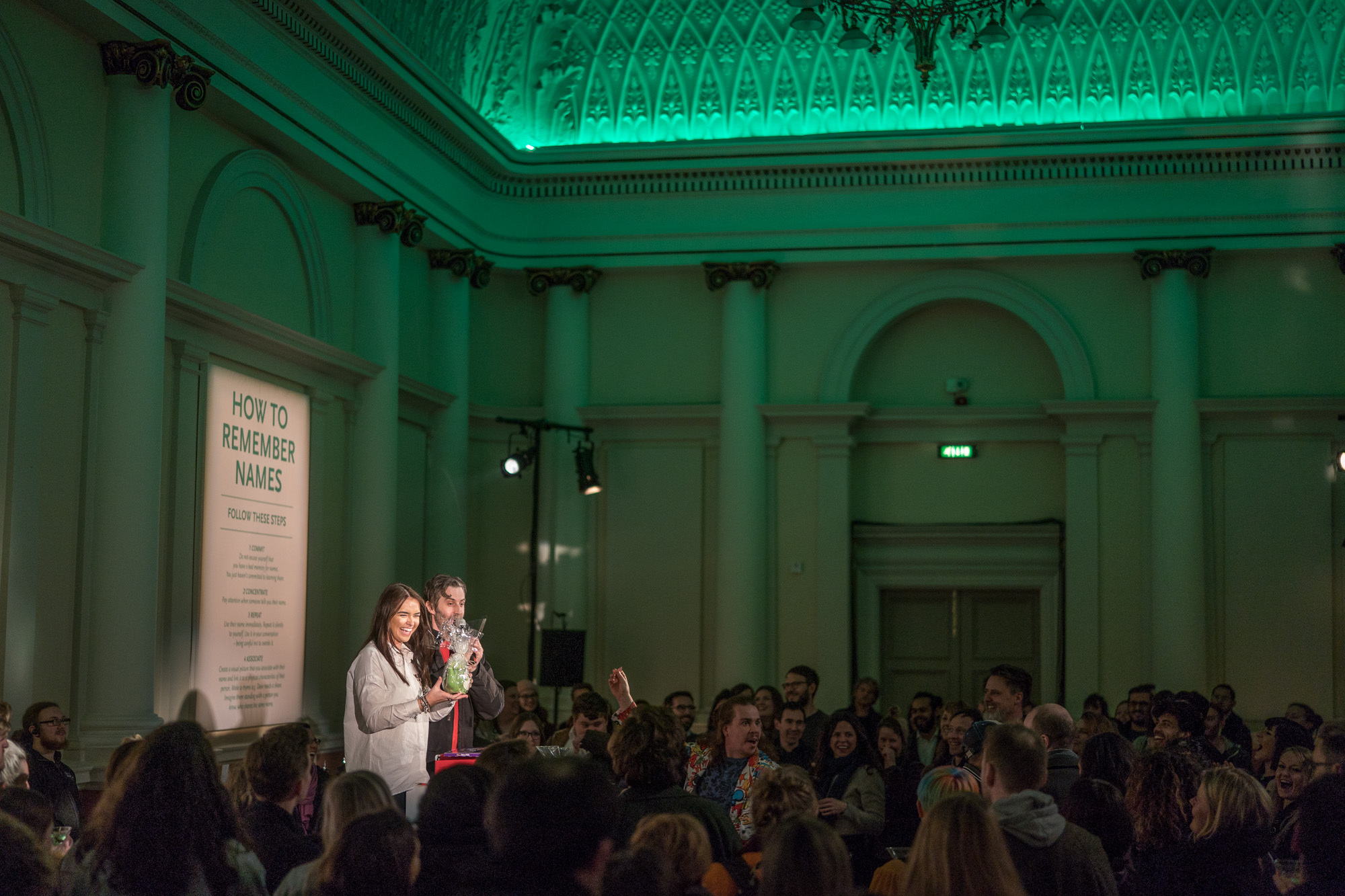
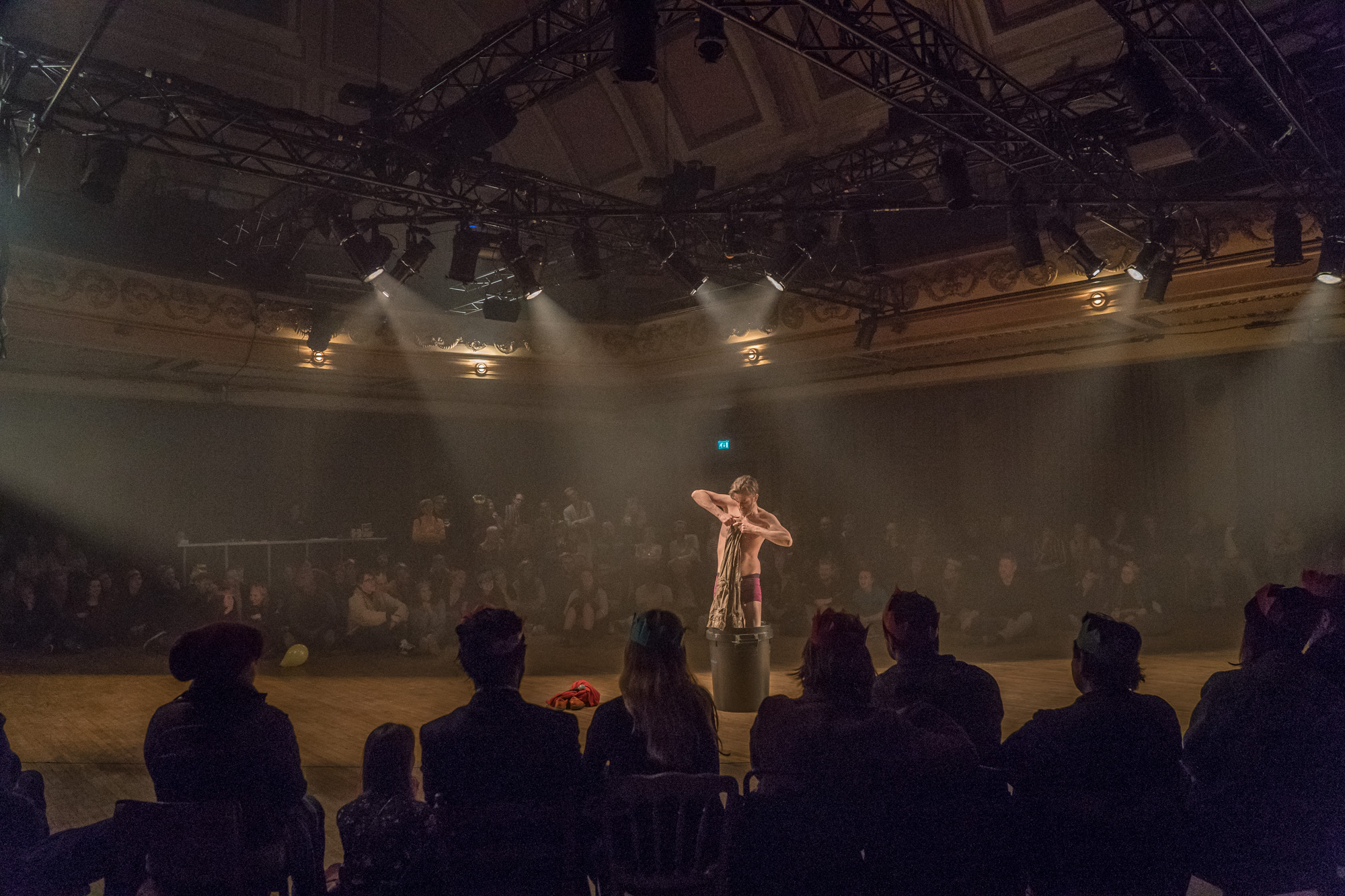

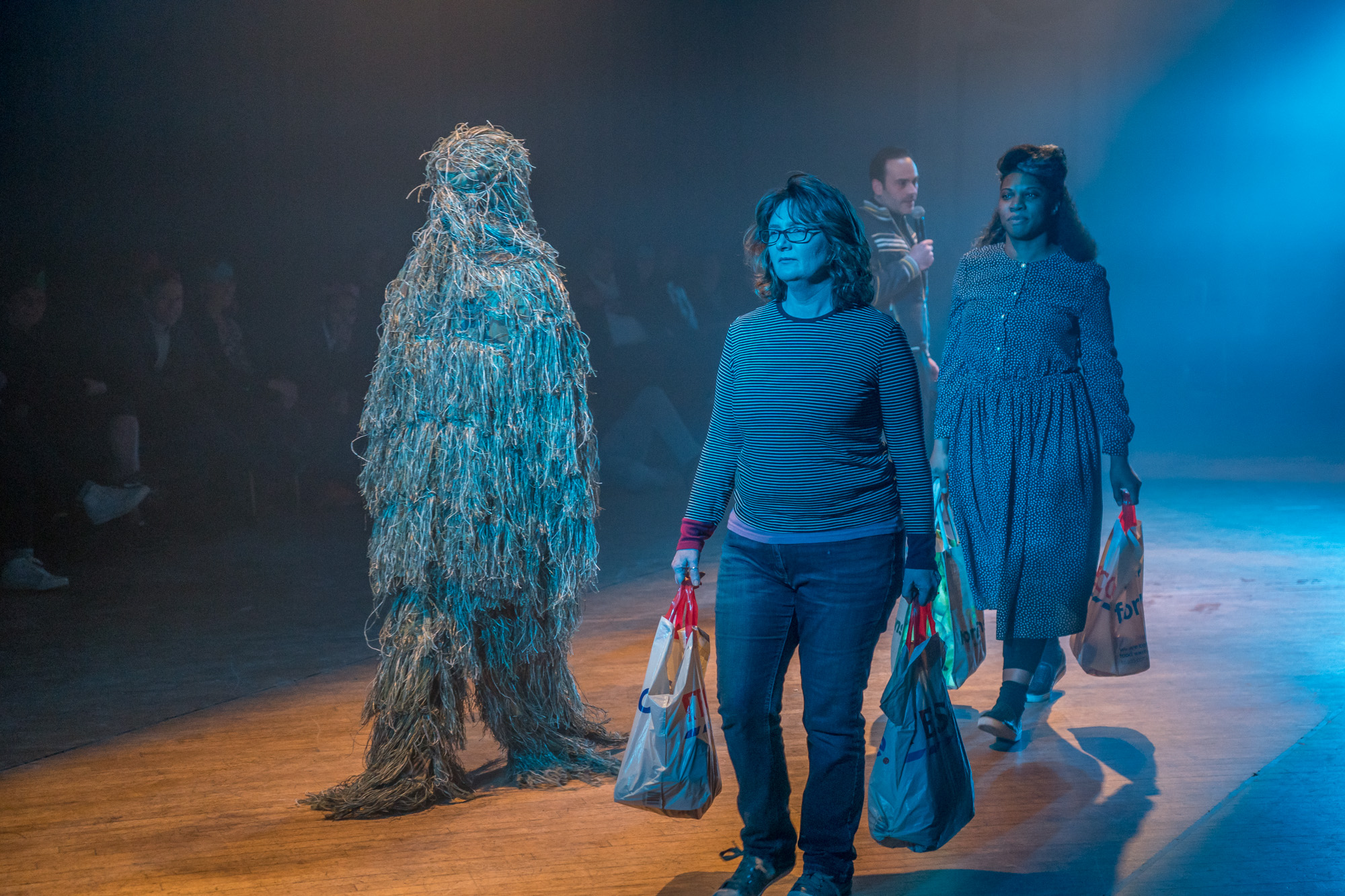
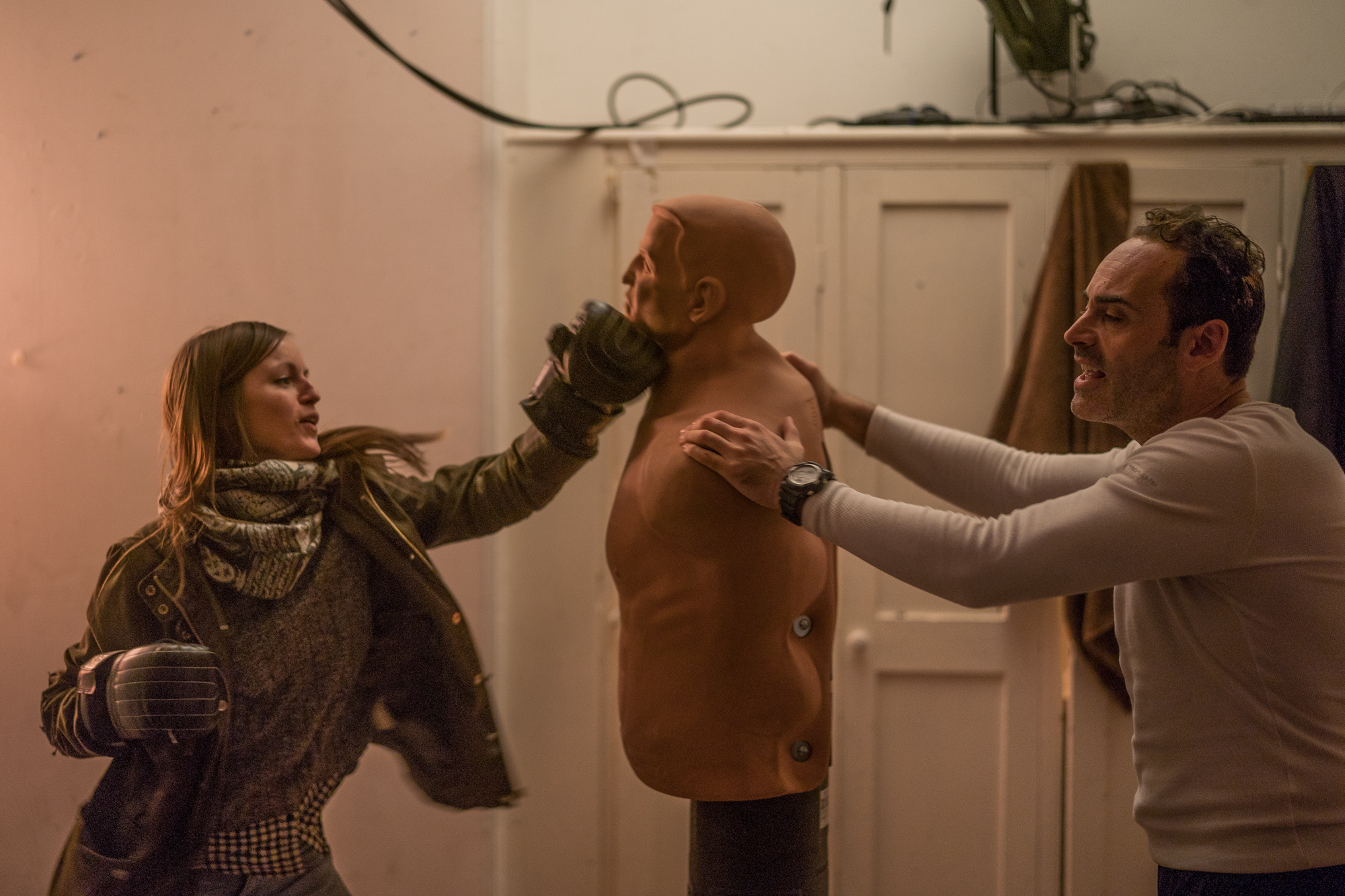
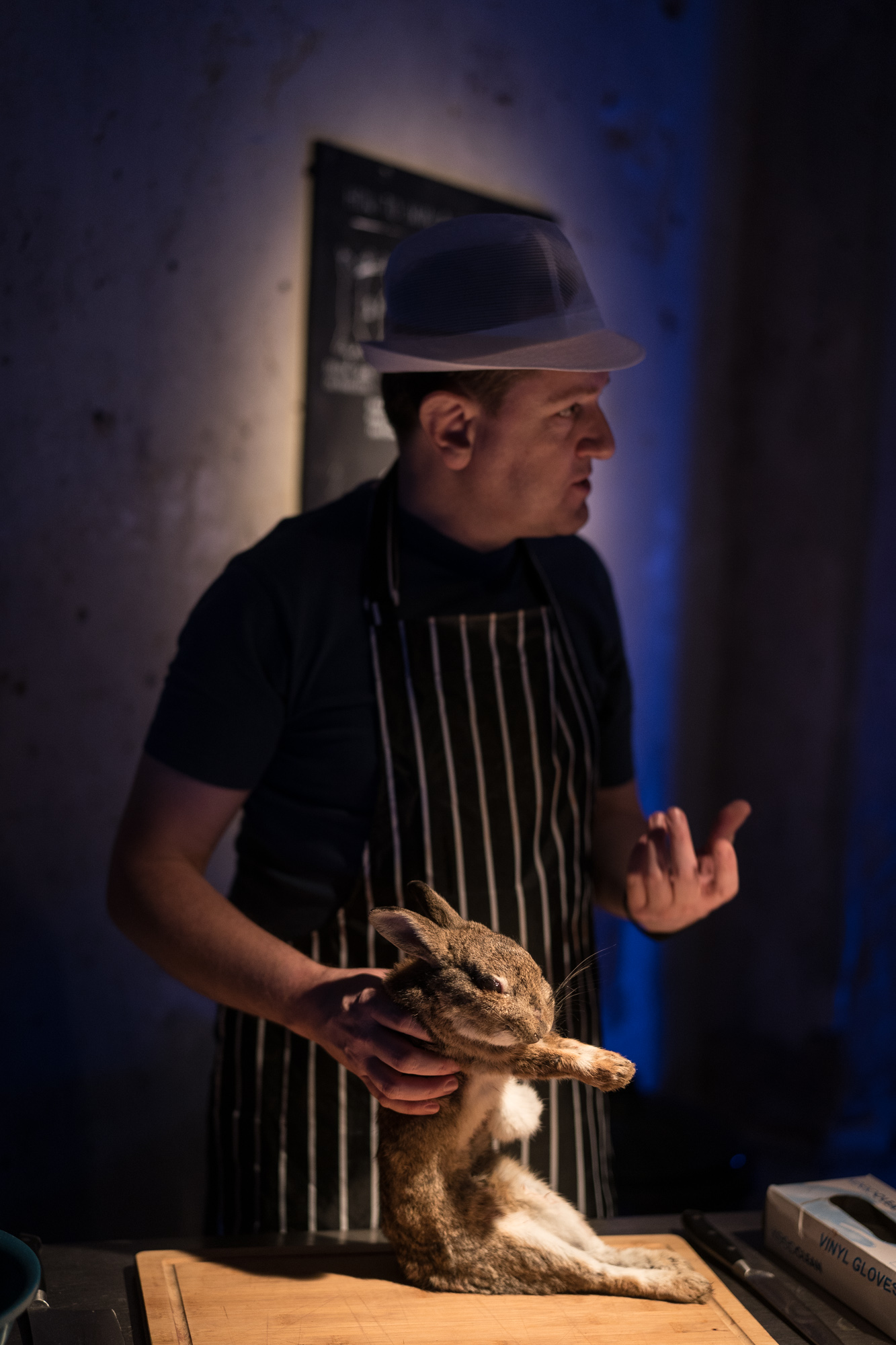
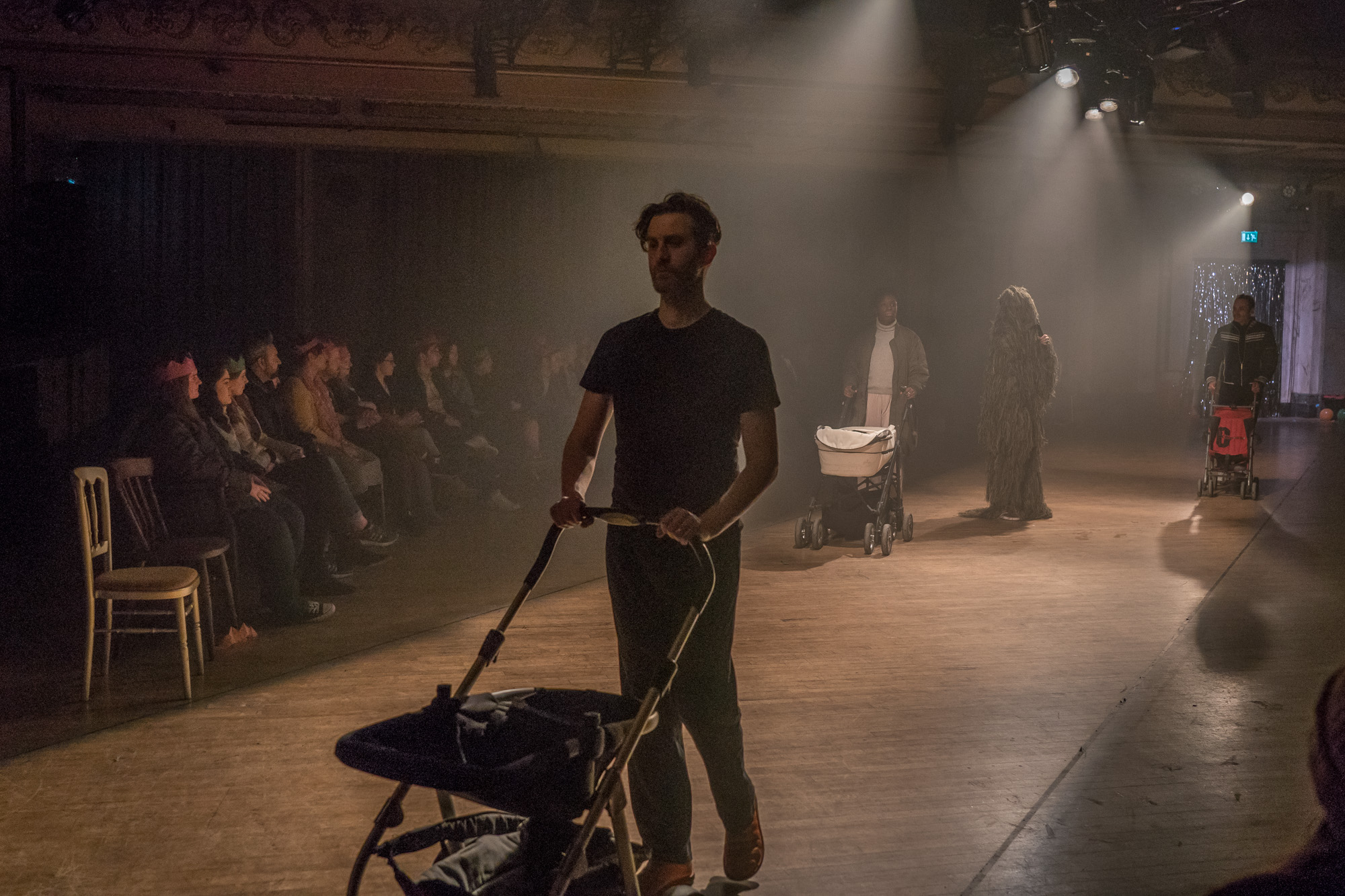
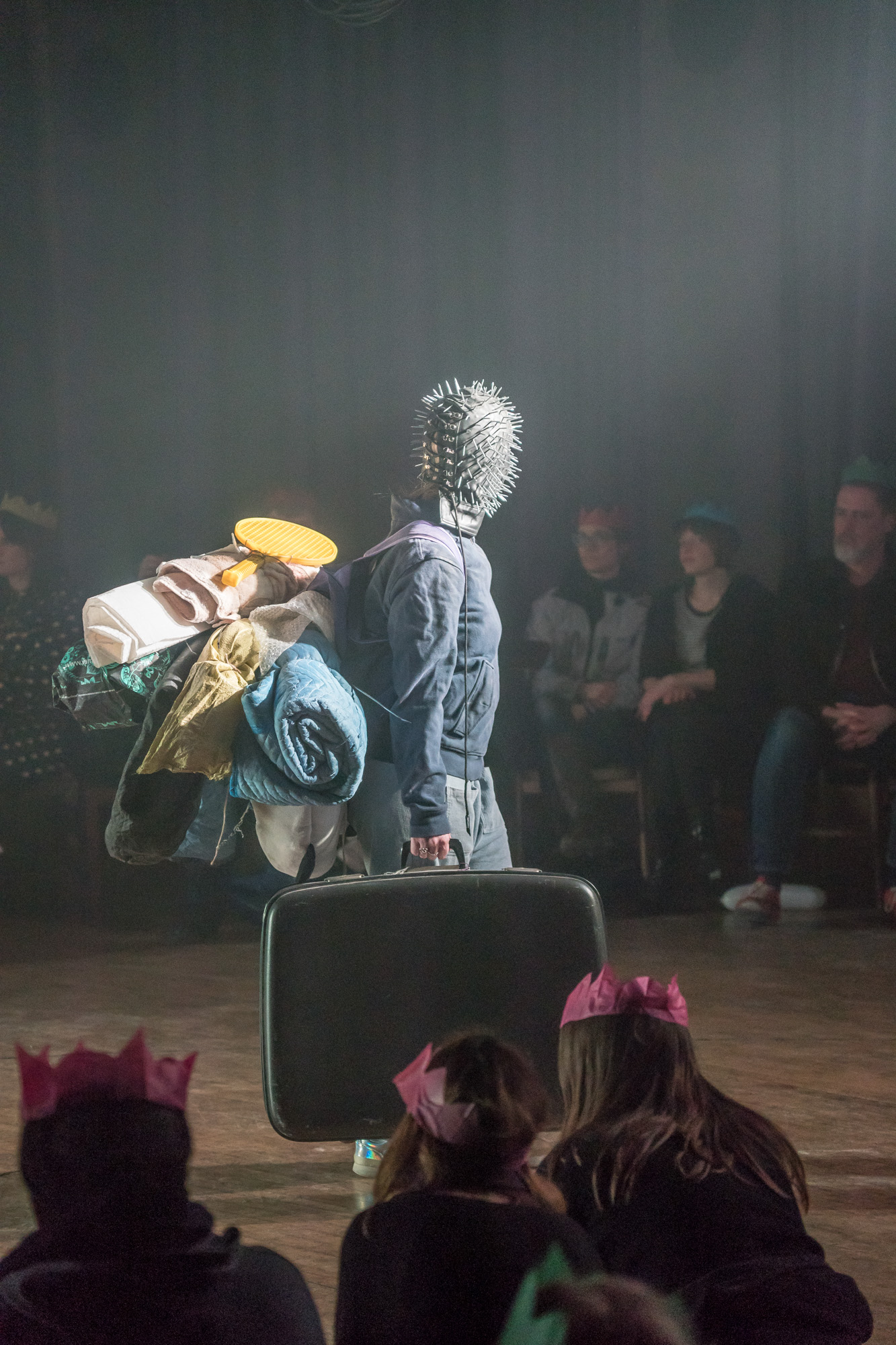
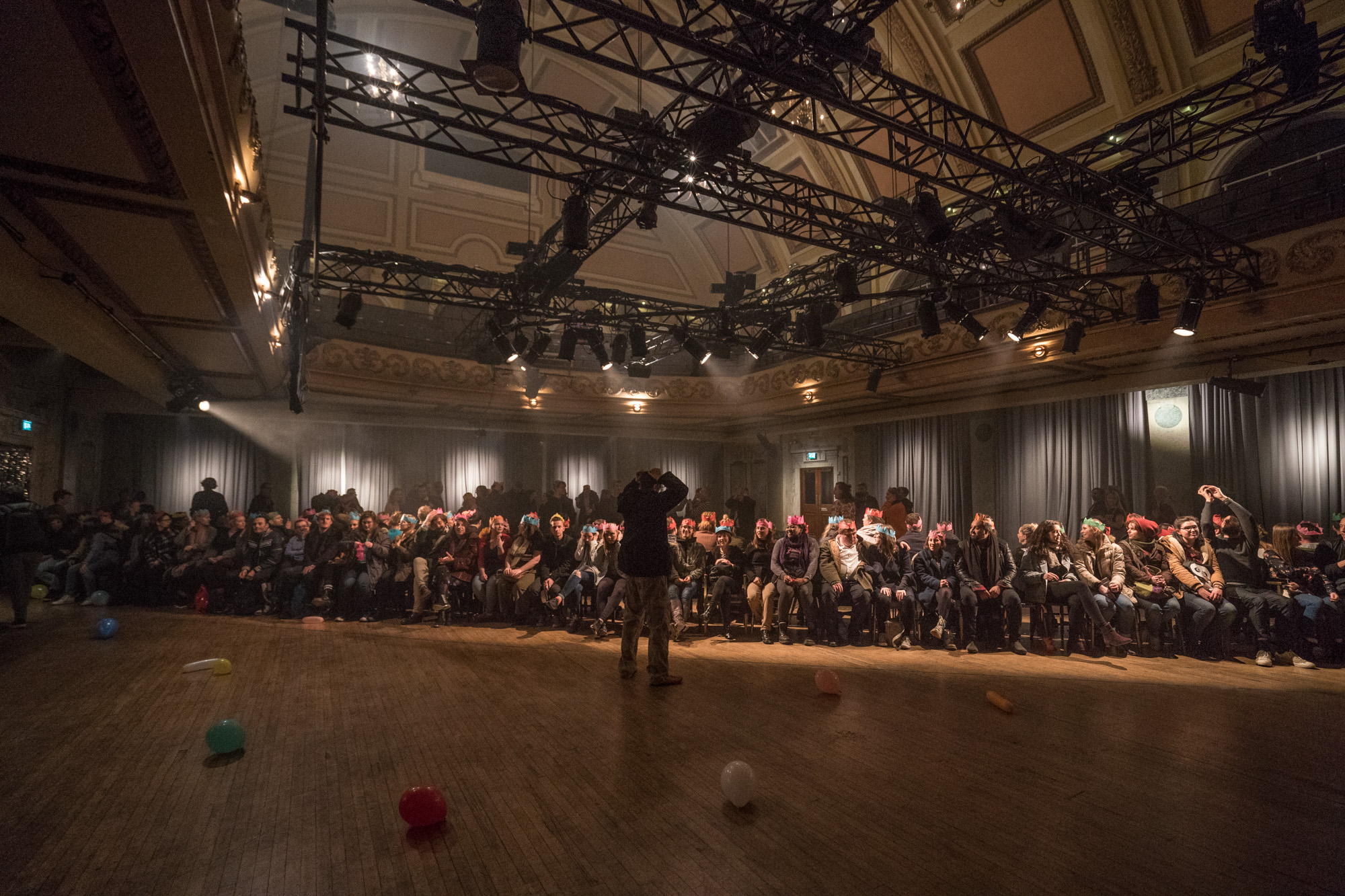
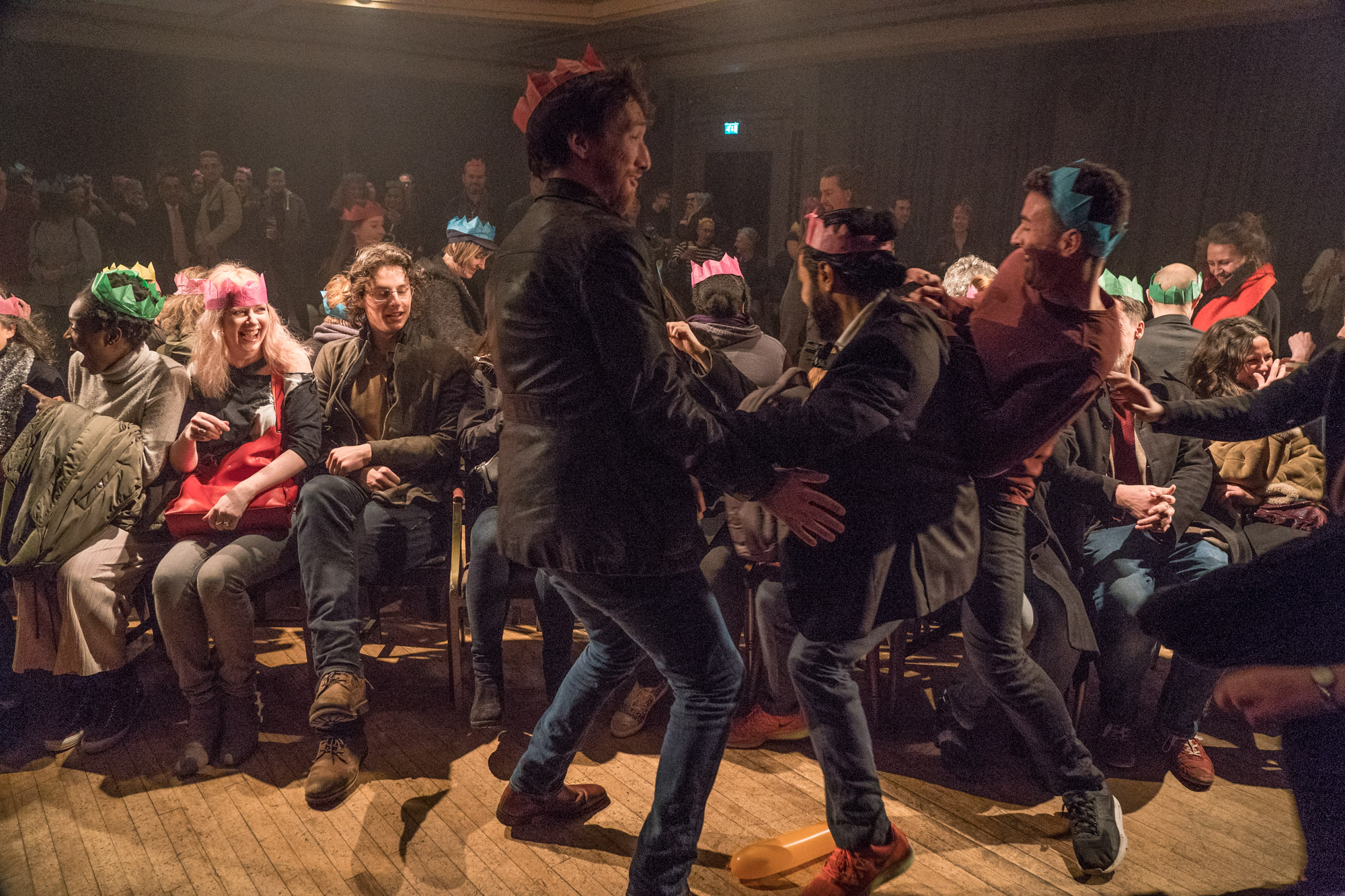
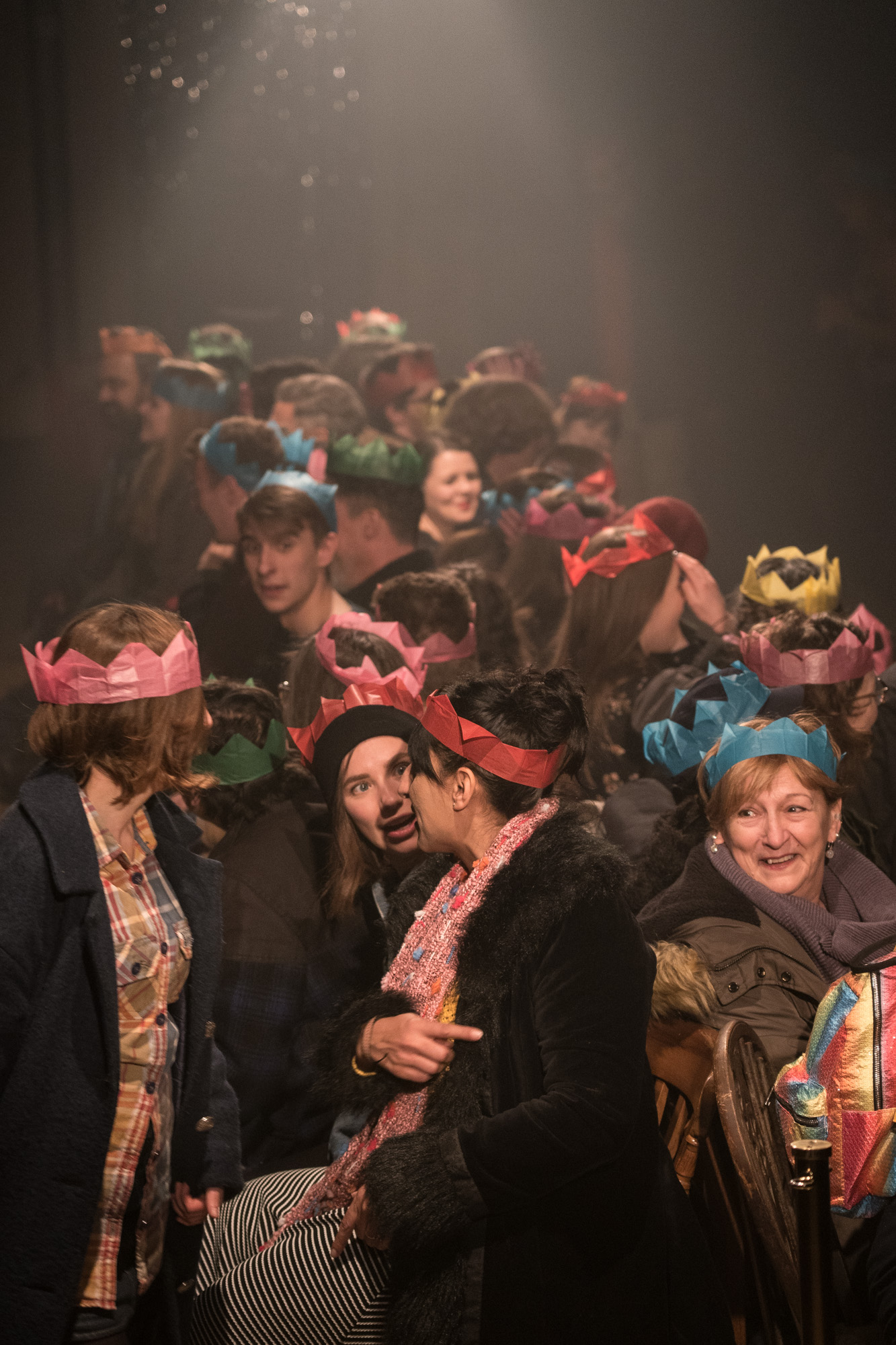
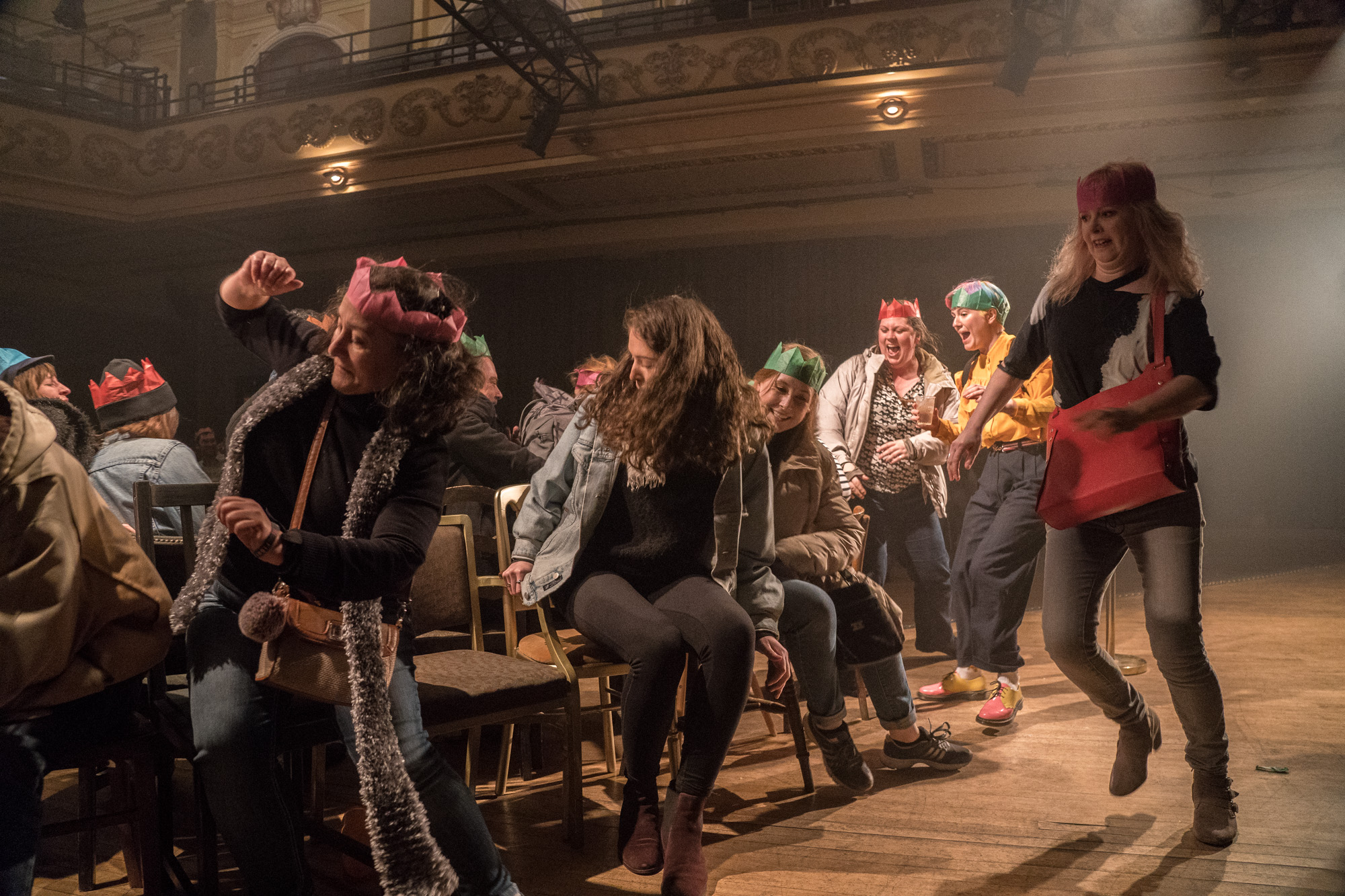
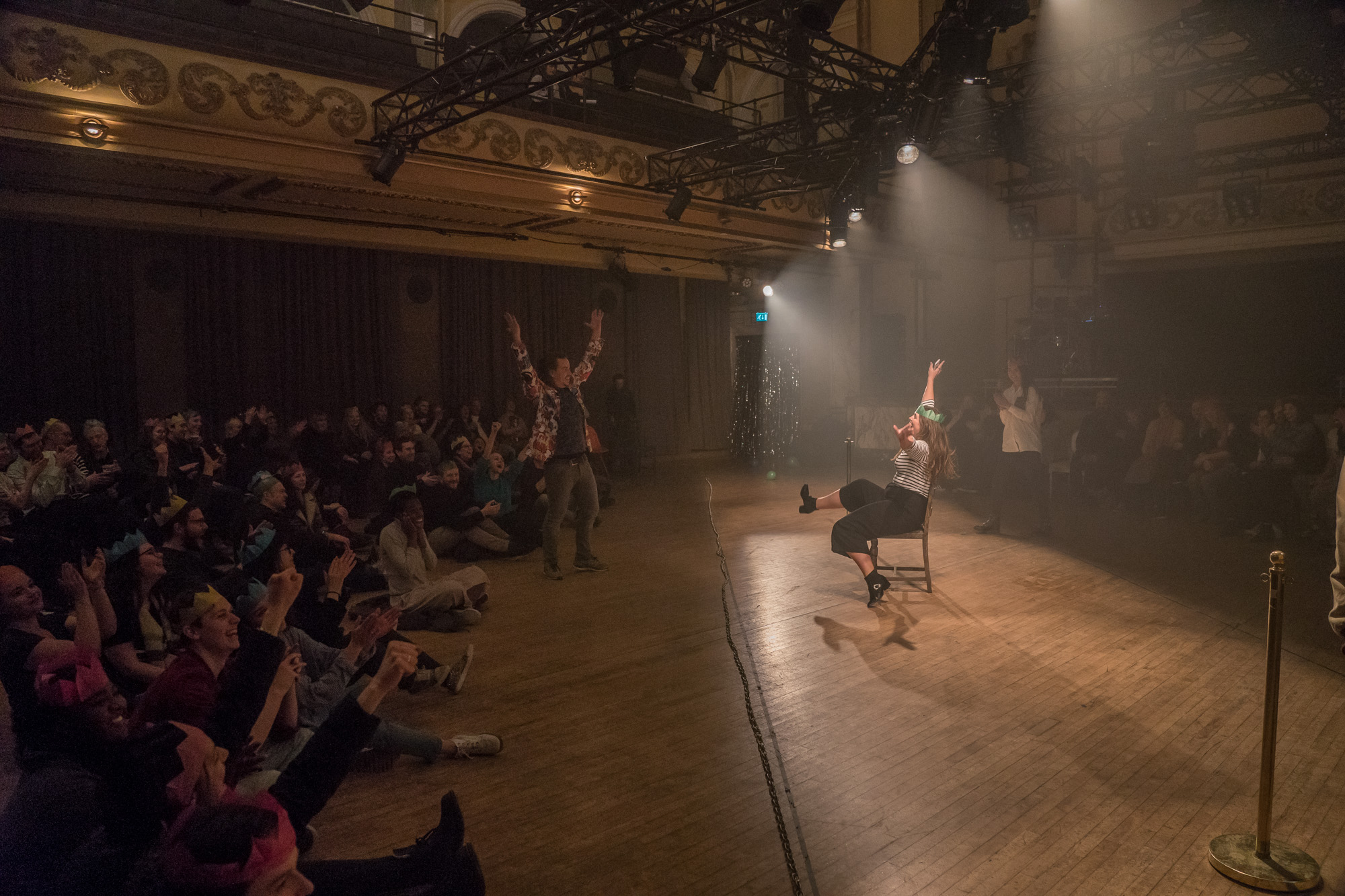
Party Skills for the End of the World by Dorothy Max Prior
Total Theatre :
“Skills. It’s all about skills. Party skills. Survival skills. Party Skills for the End of the World:
How to mix a martini – shaken not stirred, naturally. How to play a record – yes, there are people in this world old enough to drink alcohol who do not know how a turntable works. How to make a balloon animal. How to make a light bulb. How to tie a knot. How to pick a lock. How to use a knife – it needs to be sharp, and best to go for arterial points on the body that are low in fat, like behind the knees. How to turn your trousers into a float that can save you from drowning – come on, you did this at school, surely? Or scouts. Lifesaving badge. How to signal to a landing aircraft – you never know when that might come in handy. How to walk in high heels – heel, then toe, not toe first. How to dance. How to dance like all those people we see on YouTube, in all those clips we cheerily share on Facebook, to brighten up our workdays.
Party Skills for the End of the World takes us on an exhilarating journey: lambasting us with survival information (surviving life, surviving war and terror, surviving parties); embroiling us in party games (musical chairs, hurrah!); and showing us that there is nothing to fear except fear itself. Yes, bad things happen. It’s how we respond to them that matters. Do we grow ever more timid, terrified to walk the streets, or to talk to strangers? Or do we feel the fear and do it anyway? Yes, let’s dance, we have nothing to lose. We are all going to die, one way or another.
We are all going to die. Nigel Barrett – tall, broad, dressed in dusty jeans and a white T shirt stretched across his belly, a commanding presence yet vulnerable, his body still, his head face-on – stands on stage and says these words, looking out at a sea of young faces looking up at him. Are we afraid? Are we afraid of dying too quickly, without saying goodbye? Are we afraid of dying too slowly, in pain? We are all going to die. This bald statement – the only thing that we all know for sure – comes a good way into the show. We’ve supped cocktails, we’ve donned paper party hats, we’ve heard about the 32 things you need to teach your children, we’ve learnt that buttercups are poisonous, and that we should avoid furry caterpillars. We’ve seen two teams of people dressed in a hotch-potch of charity shop clothes dance a lackadaisical Macarena. We’ve peeled oranges and sewn their skin back together: ‘This is how to sew skin together. Imagine it is your neighbour, or your mother’. We’ve seen the space transform from a catwalk for survivors in evermore bedraggled and surreal garments to an arena rock gig, as two kit drummers (from the magnificent experimental music group AKDK) battle it out.
Ah yes, an arena, where there is live music, and young people enjoying a night out…
![]()
Party Skills for the End of the World is created, written and directed by Nigel Barrett and Louise Mari of the Shunt collective, and produced and co-commissioned by Manchester International Festival and Shoreditch Town Hall. It was originally made as a celebration of the people of Manchester. The artists worked in the city for months ahead of the Manchester International Festival 2017 premiere, engaging scores of people in the local community, creating and joining in with ‘skills’ workshops, and starting the process of occupying a large and complex site. On 22 May 2017, in the middle of the devising process, a shrapnel-laden homemade bomb was detonated as people were leaving Manchester Arena following a concert by the American singer Ariana Grande. Twenty-three people were killed, many of them young people, and over 500 were injured. In a country used to regular terror attacks, this one was particularly harrowing and terrible because so many of the victims were children and young adults on a night out. Now they’re coming for our children? The worst nightmare of all. This event didn’t alter the content of Party Skills: it placed the content within a particularly poignant context. Here were Nigel and Louise, working with dozens of young community performers and students from Manchester, when suddenly the very essence of the show they were all working on – how we brave the onslaught of fears the modern world throws at us – seemed suddenly to be about the current moment.
Now the show is being remounted at Shoreditch Town Hall, where a small R&D showing took place a few years ago. They have made the show in collaboration with visual artist/designer Abigail Conway. For this leg of the journey, Nigel and Louise are continuing to work with the core Manchester team, with additional participants and backstage helpers drawn from drama colleges such as the Royal Central School of Speech and Drama (where Shunt formed almost 20 years ago).
When I see Party Skills on the opening night of its London run, I go in unaware of how and when it was made, which is good as its powerful message of the power of life over death (until we die, anyway!) and facing up to fear comes through loud and clear as something with universal meaning. The Manchester arena bombing, the war in Syria, the Cuban Missile Crisis, the 1970s IRA campaign of terror on the British mainland, the rise (then fall then rise again) in knife crime, the rise in gun crime, the Blitz, the refugee crisis after the Second World War, the current refugee crisis, school shootings in the USA – depending on your age, and where you live, any one of these could have sparked the same anguished soul-searching about fear, survival, and the need to party on, regardless.
![]()
It asks us – sometimes obliquely, sometimes directly – what we feel about fear and survival. How much time and energy do we give to our nightmares? One by one, people emerge from the audience to take the performance space, stating their name, age, address, where their parents are from. They offer us helpful or humorous or disconcerting or downright ludicrous information and advice. You suspect that every single thing we hear is true, and features in some government pamphlet or other, somewhere in the world. We are bombarded with this stuff throughout our lives, and we have to judge, on a daily basis, how to respond. Perhaps we might be better off worrying less about our news-media-induced nightmares and fears, and more about the things we can change. We can choose to be kind, to help other people. We can choose how much to consume, and what resources to use. We can choose to party, rather than cower in the bunker. Yeah, let’s dance. Let’s dance like there’s no tomorrow.
There’s a robust mix of professional and community performers in the show – a marvellous mish-mash of humanity of different ages, genders, cultures, and yes – skills. I especially like the way the young people taking part are honoured and profiled. In one scene, the performers and participants walk on a diagonal across the room, making numerous transits, the lighting creating a corridor to walk along until they reach the silver slash of the exit curtain. We watch this seemingly endless river of humanity flow past, and marvel at just how beautiful and strong and watchable all human beings are.
![]()
Party Skills, perhaps because of the scale, feels more like a Shunt show than some of the previous work Nigel & Louise have made together. When we end in the Shoreditch Town Hall basement, invited to drink and play in a number of delightful cellar rooms, each hosted by a performer, it feels almost as if we are back at a Lounge night in the Shunt Vaults underneath London Bridge station. But this is no bad thing. Shunt have been the leaders and innovators in the field of immersive, site responsive theatre over the past two decades, and there is no reason at all why the company members should not continue to use the tropes and devices of their past successes. But it is also very much a Nigel and Louise show, and like previous work is tightly written and artfully directed, the dramaturgical purpose of every word, action, sound and image carefully thought through.
It’s a clever and thought-provoking show, and it’s a very loveable show. I love the site and set-up. And who doesn’t love a show with free cocktails at the start? I love the performers, and I love the audience. It’s a show in which the two can’t be separated. None of us are passive in this experience. We move around, we play games, we learn skills, we dance. Some of the actors/participants are ‘in performance mode’ from the off; others emerge throughout the evening – and in some cases we are never totally sure who is and who isn’t, as there are ‘returners’ to the show who know the score and join in with authority.
But despite – no, because of – the fun elements it is also a show unafraid to broach the most serious questions we face. Questions that human beings have been facing forever: look around you, look at the people in the room with you. We are all afraid. We all want to be loved. We are all going to die. We are all here to dance. Dance, dance, dance – for the world might end tomorrow.”
![]()
How to mix a martini – shaken not stirred, naturally. How to play a record – yes, there are people in this world old enough to drink alcohol who do not know how a turntable works. How to make a balloon animal. How to make a light bulb. How to tie a knot. How to pick a lock. How to use a knife – it needs to be sharp, and best to go for arterial points on the body that are low in fat, like behind the knees. How to turn your trousers into a float that can save you from drowning – come on, you did this at school, surely? Or scouts. Lifesaving badge. How to signal to a landing aircraft – you never know when that might come in handy. How to walk in high heels – heel, then toe, not toe first. How to dance. How to dance like all those people we see on YouTube, in all those clips we cheerily share on Facebook, to brighten up our workdays.
Party Skills for the End of the World takes us on an exhilarating journey: lambasting us with survival information (surviving life, surviving war and terror, surviving parties); embroiling us in party games (musical chairs, hurrah!); and showing us that there is nothing to fear except fear itself. Yes, bad things happen. It’s how we respond to them that matters. Do we grow ever more timid, terrified to walk the streets, or to talk to strangers? Or do we feel the fear and do it anyway? Yes, let’s dance, we have nothing to lose. We are all going to die, one way or another.
We are all going to die. Nigel Barrett – tall, broad, dressed in dusty jeans and a white T shirt stretched across his belly, a commanding presence yet vulnerable, his body still, his head face-on – stands on stage and says these words, looking out at a sea of young faces looking up at him. Are we afraid? Are we afraid of dying too quickly, without saying goodbye? Are we afraid of dying too slowly, in pain? We are all going to die. This bald statement – the only thing that we all know for sure – comes a good way into the show. We’ve supped cocktails, we’ve donned paper party hats, we’ve heard about the 32 things you need to teach your children, we’ve learnt that buttercups are poisonous, and that we should avoid furry caterpillars. We’ve seen two teams of people dressed in a hotch-potch of charity shop clothes dance a lackadaisical Macarena. We’ve peeled oranges and sewn their skin back together: ‘This is how to sew skin together. Imagine it is your neighbour, or your mother’. We’ve seen the space transform from a catwalk for survivors in evermore bedraggled and surreal garments to an arena rock gig, as two kit drummers (from the magnificent experimental music group AKDK) battle it out.
Ah yes, an arena, where there is live music, and young people enjoying a night out…

Party Skills for the End of the World is created, written and directed by Nigel Barrett and Louise Mari of the Shunt collective, and produced and co-commissioned by Manchester International Festival and Shoreditch Town Hall. It was originally made as a celebration of the people of Manchester. The artists worked in the city for months ahead of the Manchester International Festival 2017 premiere, engaging scores of people in the local community, creating and joining in with ‘skills’ workshops, and starting the process of occupying a large and complex site. On 22 May 2017, in the middle of the devising process, a shrapnel-laden homemade bomb was detonated as people were leaving Manchester Arena following a concert by the American singer Ariana Grande. Twenty-three people were killed, many of them young people, and over 500 were injured. In a country used to regular terror attacks, this one was particularly harrowing and terrible because so many of the victims were children and young adults on a night out. Now they’re coming for our children? The worst nightmare of all. This event didn’t alter the content of Party Skills: it placed the content within a particularly poignant context. Here were Nigel and Louise, working with dozens of young community performers and students from Manchester, when suddenly the very essence of the show they were all working on – how we brave the onslaught of fears the modern world throws at us – seemed suddenly to be about the current moment.
Now the show is being remounted at Shoreditch Town Hall, where a small R&D showing took place a few years ago. They have made the show in collaboration with visual artist/designer Abigail Conway. For this leg of the journey, Nigel and Louise are continuing to work with the core Manchester team, with additional participants and backstage helpers drawn from drama colleges such as the Royal Central School of Speech and Drama (where Shunt formed almost 20 years ago).
When I see Party Skills on the opening night of its London run, I go in unaware of how and when it was made, which is good as its powerful message of the power of life over death (until we die, anyway!) and facing up to fear comes through loud and clear as something with universal meaning. The Manchester arena bombing, the war in Syria, the Cuban Missile Crisis, the 1970s IRA campaign of terror on the British mainland, the rise (then fall then rise again) in knife crime, the rise in gun crime, the Blitz, the refugee crisis after the Second World War, the current refugee crisis, school shootings in the USA – depending on your age, and where you live, any one of these could have sparked the same anguished soul-searching about fear, survival, and the need to party on, regardless.

It asks us – sometimes obliquely, sometimes directly – what we feel about fear and survival. How much time and energy do we give to our nightmares? One by one, people emerge from the audience to take the performance space, stating their name, age, address, where their parents are from. They offer us helpful or humorous or disconcerting or downright ludicrous information and advice. You suspect that every single thing we hear is true, and features in some government pamphlet or other, somewhere in the world. We are bombarded with this stuff throughout our lives, and we have to judge, on a daily basis, how to respond. Perhaps we might be better off worrying less about our news-media-induced nightmares and fears, and more about the things we can change. We can choose to be kind, to help other people. We can choose how much to consume, and what resources to use. We can choose to party, rather than cower in the bunker. Yeah, let’s dance. Let’s dance like there’s no tomorrow.
There’s a robust mix of professional and community performers in the show – a marvellous mish-mash of humanity of different ages, genders, cultures, and yes – skills. I especially like the way the young people taking part are honoured and profiled. In one scene, the performers and participants walk on a diagonal across the room, making numerous transits, the lighting creating a corridor to walk along until they reach the silver slash of the exit curtain. We watch this seemingly endless river of humanity flow past, and marvel at just how beautiful and strong and watchable all human beings are.

Party Skills, perhaps because of the scale, feels more like a Shunt show than some of the previous work Nigel & Louise have made together. When we end in the Shoreditch Town Hall basement, invited to drink and play in a number of delightful cellar rooms, each hosted by a performer, it feels almost as if we are back at a Lounge night in the Shunt Vaults underneath London Bridge station. But this is no bad thing. Shunt have been the leaders and innovators in the field of immersive, site responsive theatre over the past two decades, and there is no reason at all why the company members should not continue to use the tropes and devices of their past successes. But it is also very much a Nigel and Louise show, and like previous work is tightly written and artfully directed, the dramaturgical purpose of every word, action, sound and image carefully thought through.
It’s a clever and thought-provoking show, and it’s a very loveable show. I love the site and set-up. And who doesn’t love a show with free cocktails at the start? I love the performers, and I love the audience. It’s a show in which the two can’t be separated. None of us are passive in this experience. We move around, we play games, we learn skills, we dance. Some of the actors/participants are ‘in performance mode’ from the off; others emerge throughout the evening – and in some cases we are never totally sure who is and who isn’t, as there are ‘returners’ to the show who know the score and join in with authority.
But despite – no, because of – the fun elements it is also a show unafraid to broach the most serious questions we face. Questions that human beings have been facing forever: look around you, look at the people in the room with you. We are all afraid. We all want to be loved. We are all going to die. We are all here to dance. Dance, dance, dance – for the world might end tomorrow.”
